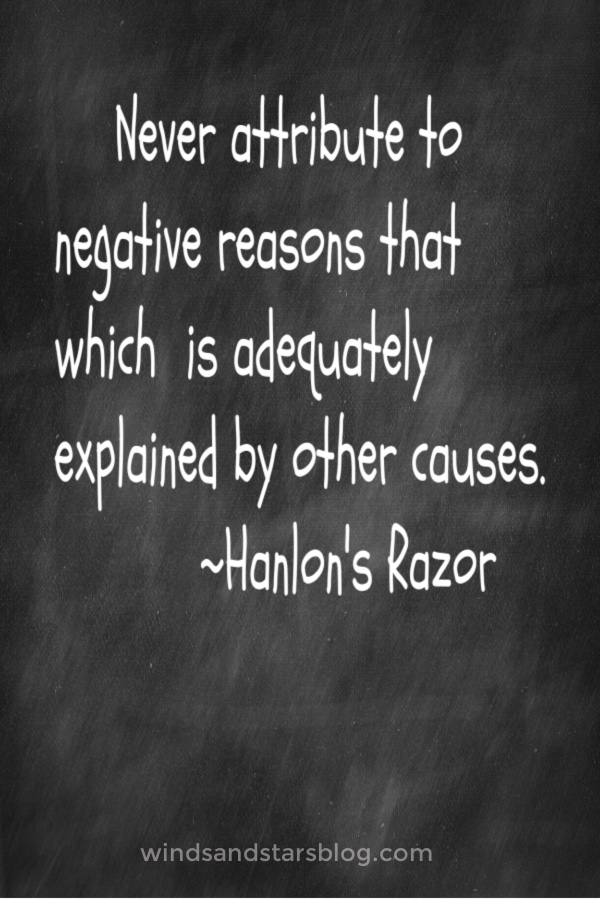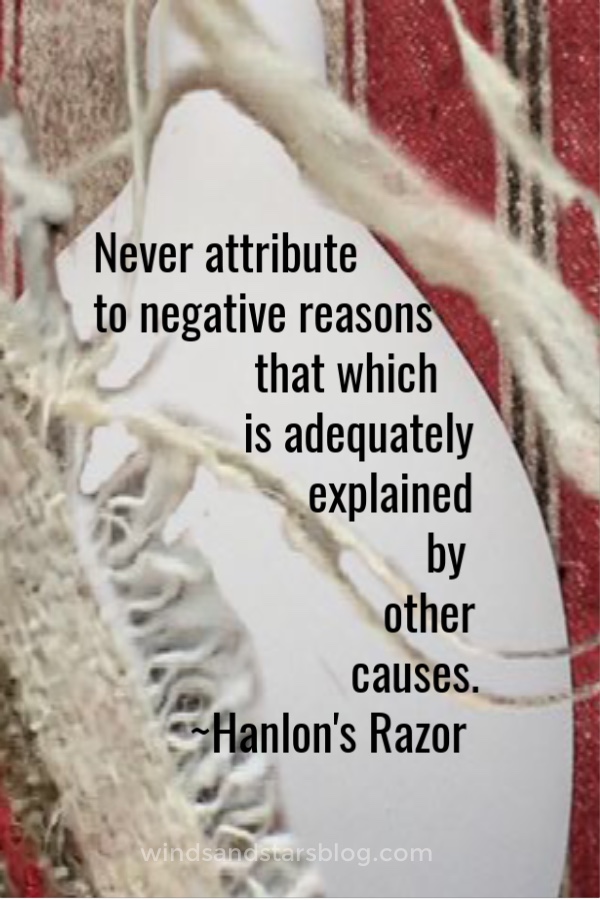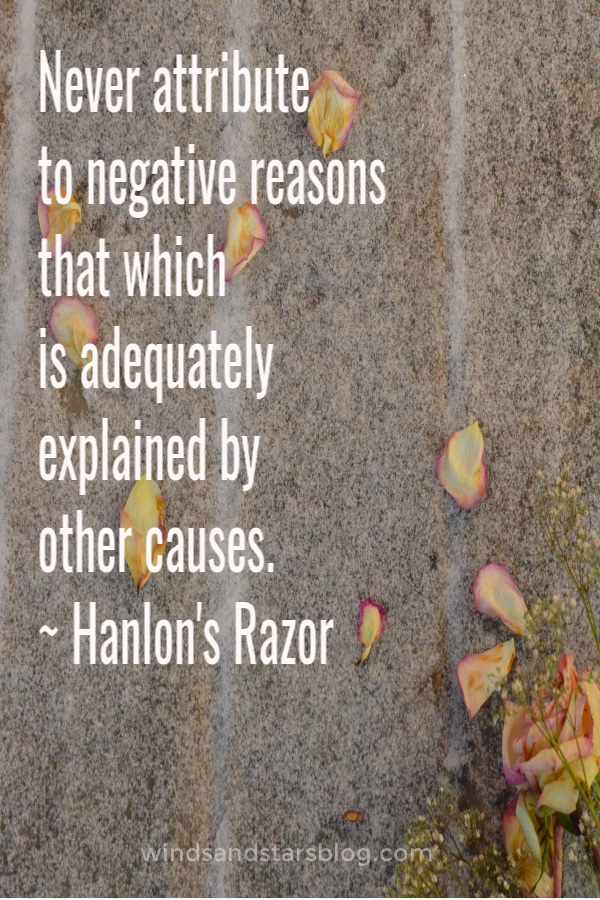Bananas about Bananas
No I didn’t use Hanlon’s Razor to split bananas.
But . . . if life was a banana split, I’d start with the chocolate, then work my way through the peanuts, whipped cream, ice cream, and finally if I had room, the bananas. For my husband, it’s the reverse order. And together, we’d lick that platter clean.
My husband travels a lot. He’s often away for 3-4 days out of the week. So if I’ve worked my way through the pantry and there’s nothing left of interest, I’ll eat bananas. Dipped in melted peanut butter of course.
Anyway, when my husband got home last week, he went searching for a banana.
Much to his dismay, they were gone.
It’s not like we live out of town and only go for groceries once a month. But his disappointment was real.
It went like this.
“Where are the bananas?”
“Gone.”
“All of them? You ate them all?”
“Well you were away for 4 days.”
“What about the whipped cream?”
“I topped the bananas and melted peanut butter with it. Gone.”
“What about the peanuts?”
“Nope. They’re gone too.”
“The chocolate?”
“Oh that was gone the first day. I do eat while you’re away you know.”
If you have an unwelcome image of me eating a house-sized banana split throughout the week, it didn’t happen that way. We’re talking a banana a day. Which isn’t excessive. Unless you live with someone who’s possessive of the bananas.
Anyway, without Hanlon’s razor in our back pockets, we both got accusatory and defensive.
In disappointment, he accused me of eating all the bananas. Like I was deliberately sabotaging his chance at happiness.
In response, I accused him of wanting me to quit eating and go into hibernation when he’s away. Which wouldn’t be a bad idea because right now sunrise is at 9:33 a.m. and sunset is 4:27 p.m. When there’s that much dark, you need food of the comforting kind.
So how could we have handled this better?
Hanlon’s Razor states, “Don’t attribute to malice that which is better explained by neglect.”
Another way of saying this would be “Never attribute to negative reasons that which is adequately explained by other causes”.
My husband and I both attributed malice to that which was better explained by well, everyday eating on my part, and an unfulfilled craving for bananas on his part.
Remember Occam’s Razor?
The problem solving principle? The heuristic or rule of thumb that helps us ‘shave’ off unlikely explanations?
Hanlon’s Razor is another principle of thinking that is useful to have in our toolbox.
However, these principles are only as useful as our willingness to apply them. Nothing reduces story faster than the facts. Well sometimes truth is stranger than fiction. But for the most part, we love to fill in the gaps in order to create a better story.
Here’s a few guidelines to follow when interpreting someone else’s behaviour.
1. Beware of the human desire for story.
- It’s very tempting to overgeneralize, embellish, and misconstrue in order to bolster our story. Sometimes for entertainment. Sometimes for rationalizing.
2. Keep in mind the brain’s propensity for the negative.
- It’s important to correct for this so you don’t see the proverbial saber toothed tiger behind every bush.
3. If you’re tired, or hungry, or stressed it’s harder to even want to apply a tool because these conditions make you more argumentative.
- And Hanlon’s Razor has the power to end verbal duels so if you’re looking for a fight, it’s a buzz kill. The rewards to your relationships are worth it though.
4. Don’t assume intent.
- Some of us have a tendency to engage in “mind reading” which isn’t the same as empathy. Mind reading is often a projection of our own thinking and responses rather than an attempt to see life from someone else’s perspective.
Hanlon’s Razor is a useful tool for navigating relationships.
Whether it’s personal or professional relationships, this principle helps us cut through our own emotional baggage so we can see more clearly.
Hanlon’s Razor cuts away:
- hasty judgement
- confirmation bias – what we look for is what we find
Hanlon’s Razor helps us be more:
- rational
- empathetic
- there could be other causes
- always better to confirm than to assume
- calm
How to use Hanlon’s Razor
- stay open and curious
- generate possible reasons for the behaviour
- this makes it easier to take corrective action – emotions are removed and with greater clarity, you’re better able to address the situation
- step into their shoes (empathy).
- understand your own intent
- if you feel vindictive – you’ll assume they too are being vindictive
- understand your own intent
- Give others the benefit of the doubt
Beware the little things
It’s the minor things, like not finding any bananas, that triggers the impulse to assume that people have acted with ill intent. But if unchecked it can damage relationships and keep us in a constant state of hypervigilance.
No-one is immune to the almost instinctive reaction to something that puts us at a disadvantage.
Think about it.
How’d you react the last time someone cut you off in traffic? Or didn’t respond to your email or text? Or failed to smile and say “hi” when they passed you on the sidewalk or in the hallway?
What reasons do you have when you do each of the above?
Cleave ever to the sunnier side of doubt.
Lord Tennyson
You might be thinking – well duh!
We’ve all grown up with the adage, “give them the benefit of the doubt”.
And yes, Hanlon’s Razor is basically that. But giving it a name and consciously putting it into your toolbox gives it validity. There’s good evidence that the majority of people have our best interest in mind. Or at the very least don’t wish us harm.
Goethe wrote: “Misunderstandings and neglect occasion more mischief in the world than even malice and wickedness. At all events, the two latter are of less frequent occurrence.”
Next time you’re prone to be misinterpret a comment or a situation, put Hanlon’s Razor to work. You’ll be glad you did.
P.S. We’d love to hear your thoughts on Hanlon’s Razor. Leave them in the comments below.

Yes! I want to receive your newsletter!
Simply . . .
~ Priscilla
P.S.S. Here’s a couple of links if you’d like to explore the topic of Hanlon’s Razor further.
https://medium.com/personal-growth/hanlons-razor-how-to-avoid-common-missteps-in-judgment-c83afc4e2168 Hanlon’s Razor: How to Avoid Common Missteps in Judgment by Mike Sturm
https://effectiviology.com/hanlons-razor/ Hanlon’s Razor: Why You Shouldn’t Start By Assuming the Worst






